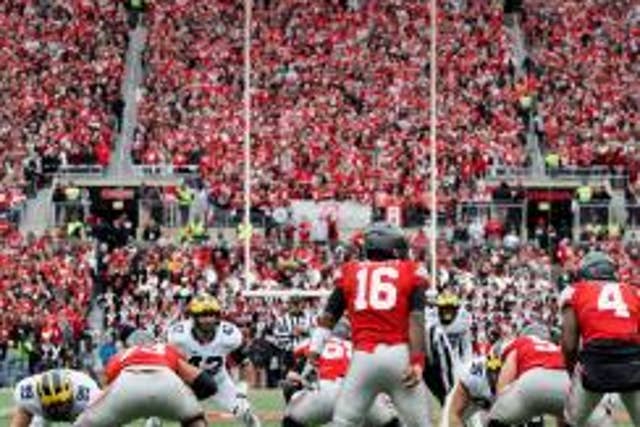
Analyzing former coach Art Briles's lawsuit against Baylor officials
It was only six months ago when Art Briles and Baylor University negotiated a contract settlement that ended the 61-year-old football coach’s employment at the university. The settlement seemingly closed one part of a chilling, multi-chapter controversy about Baylor football players raping women. Briles’s chapter was re-opened on Thursday when he sued four prominent Baylor officials for libel and other claims.
As explained on SI.com at the time, the June 2016 settlement between Briles and Baylor staved off Briles suing the school over its leaders’ efforts to terminate the remaining eight years of Briles’s 10-year contract, a deal that reportedly paid Briles approximately $6 million per year. In May and June of this year, Briles and other university officials were being ousted due to their alleged failure to capably prevent, and respond to, sexual assaults committed by football players. Briles rejected such a depiction and insisted that his then-pending ouster would have constituted a breach of contract, among other kinds of unlawful conduct. Briles raised those arguments in court—specifically, in an emergency motion filed in the U.S. District Court for the Western District of Texas. But within days, Briles and Baylor had settled their dispute through mediation. It seemed that the two sides had called a truce.
A lot can happen to truces over the course of six months.

On Thursday, Briles was back in court to take on Baylor. His lawsuit, filed in the District Court of Llano County (Texas), alleges that three Board of Regents members—J. Cary Cray, Ronald Murff and David Harper—along with Baylor senior vice president Reagan Ramsower libeled and slandered Briles. Those officials, Briles charges, publicly and knowingly asserted lies about Briles. The most damaging alleged lie, according to Briles, is that he knew that his players had committed sexual assault and then failed to take the appropriate action.
Briles contends that purported lies about him reflect a media strategy hatched by “spin doctors” at the public relations firm G.F. Bunting & Co. This company, which Briles not so gently directs the Texas court to observe is from out-of-state California, has “embarked upon a campaign of malice” against Briles, a native Texan. This “campaign,” Briles insists, “includes re-creation and invention of facts to manipulate public opinion and to cover the past and ongoing wrongdoing, mistakes and failures of the Baylor University Board of Regents.”
• Baylor hires Temple's Matt Rhule as next head coach
Briles also asserts that his inability to secure a new coaching job reflects a conspiracy by the defendants to dissuade other schools from hiring him. This past Saturday, the chairman of the University of Houston System Board of Regents, Tilman Fertitta, took the unusual step of issuing a statement expressing that while Briles was interested in the school’s open coaching job, the school would not consider Briles. Fertitta’s announcement may have played a factor in Briles’s thinking, as it seemed to confirm that he is “damaged goods” on the coaching market.
While others portray Briles as a culprit, he maintains that he is a scapegoat
Briles become a focal point of blame this past May, when the Baylor Board of Regents issued a 13-page “findings of fact.” These findings constituted summaries and analyses of evidence gathered by Pepper Hamilton, a law firm hired by Baylor to investigate the university’s handling of sexual assault incidents. The report highlights the alleged failure of the football coaching staff—led by head coach Briles—to stop and deter sexual assaults. Along those lines, the report blames the coaches for endangering campus safety. The report led Baylor to seek termination of Briles’s employment with the school. As referenced above, after some legal wrangling and mediation sessions, Briles and Baylor negotiated a termination settlement in June 2016.
In various public remarks since leaving Baylor in June, Briles has generally maintained that he acted in a manner consistent with both the law and his morals. For instance, in August, Briles told ESPN’s Todd Archer he was “dumbfounded” by his ouster from Baylor and was surprised by the factual assertions against him. However, a month later, Briles acknowledged that he “made mistakes [and] did wrong” in response to the sexual assault controversy. Briles, though, seemed to qualify his admission when stressing that his mistakes were about the “bad things” committed by others under his watch—as he put it, “the captain of the ship goes down with it”—rather than the “bad things” others allege Briles committed.
• Lamar Jackson, Dede Westbrook, Jabrill Peppers lead SI's 2016 All-America team
At the beginning of November, 60 Minutes Sports aired an eye-opening special report on the Baylor scandal. The report portrayed the scandal as dramatically worse than was previously understood (in fairness to Baylor, the university rejects some of the report’s claims). For example, the university’s Title IX coordinator, Patty Crawford, was repeatedly denied campus police reports about alleged gang rapes involving football players. The report, along with accompanying media stories, also included statements by Baylor officials—including those named in Briles’s lawsuit—that referred to Briles and how he allegedly instilled a culture of winning over everything else. Further, members of Baylor’s Board of Regents told the Wall Street Journal that Briles failed to notify the school’s Title IX coordinator about one of the victims. Briles charges that this information is categorically false and was never discussed with him while he was a Baylor employee. Briles also insists the Wall Street Journal story was planted by Baylor’s PR firm, Bunting.
Termination settlement between Briles and Baylor did not work
Typically when a coach and school negotiate a termination settlement, it includes language that expresses, in so many words, that in exchange for the coach being paid a sum of money, the coach relinquishes any legal claims he or she might have against the school. A settlement agreement, however, may not address possible claims that arise after the settlement. Here, Briles insists that negative statements made about him after he left Baylor—namely, the assertions raised in the 60 Minutes Sports report and accompanying media coverage—give rise to actionable material that is not governed by the June 2016 termination settlement. When they respond to Briles’s lawsuit, it is possible the four Baylor defendants will claim the settlement’s language precludes this new lawsuit.

Regardless, Briles’s lawsuit reveals the risk Baylor took in having multiple persons associated with the school interviewed by media about the scandal: While a university spokesperson or general counsel might refrain from mentioning Briles by name out of concern Briles might then sue, others associated with the school may be less sensitive to that possibility.
Briles has an uphill legal battle...
Briles’s defamation claims—libel (defamation in writing) and slander (defamation in spoken word)—rest on establishing a factual point that many suggest is untrue: that Briles sufficiently notified the appropriate university officials about alleged sexual assaults. Multiple persons connected to Baylor claim or imply that Briles badly failed to provide such notification. As noted above, Briles himself acknowledges he made “mistakes” in connection to the scandal. In his lawsuit, Briles rejects these critiques. Further, he highlights that his obligations were limited to those of a coach, rather than a public safety officer. Clarifying the scope of Briles’s obligations to report could prove the determining factor in his case. He must do so to prove others are lying about his reporting of incidents. To be sure, if Briles is lying or embellishing in this lawsuit, his decision to sue—and thus potentially be required to give sworn testimony during pretrial discovery about what he knew while at Baylor—could backfire badly on him.
Even if Briles can prove the defendants are lying, note that he is a public figure. This changes the dynamics of his defamation claims. He must show that not only are the four Baylor defendants lying about him, but that they set out to lie about him. To advance this theory, Briles’s lawsuit continuously refers to Baylor’s hiring of the PR firm, Bunting. From that point, Briles claims that Bunting—while acting under the orders of Baylor’s Board of Regents—hatched a plan to dupe media. This alleged duping involved pinning the blame for Baylor’s sexual assault scandal on one particular ex-employee—Art Briles—while deflecting blame from those officials still at Baylor.

For example, Briles charges that Bunting is known for “manipulating the news media by providing information at inconvenient times, such as late on Friday afternoons, where there is inadequate time for any response and when it is not possible for the media to verify the information before publishing it.” Briles also notes that this “devious ... strategic communication” late in the day on Friday provided “talking points and ticker information for Saturday, which is the biggest day of the week for college football.”
Briles’s contention that the defendants have conspired to prevent him from getting another job is a similarly difficult claim to advance. The specific claim—tortious interference with a prospective business relationship—requires Briles to produce evidence that portrays the defendants as trying to prevent him from getting another coaching job. Briles suggests that the alleged defamatory statements about him are intended to not only insulate Baylor from further criticism but also to make Briles radioactive on the job market. The defendants can likely rebut this allegation by noting that not only was it not their intent to see Briles without a coaching job, but that they would prefer Briles get a coaching job as he would then be less likely to file lawsuits against them. Also, Briles’s admission of some degree of responsibility (discussed above) in a disturbing sexual assault scandal could be reason alone for a school to not want him on its coaching staff.
... but pretrial discovery could prove problematic for Baylor
Even though the four defendants are poised to defeat Briles’s lawsuit, Briles can inflict a good deal of harm on the university before the case is resolved. This is mainly through pretrial discovery. If Briles’s lawsuit advances past an early dismissal, the lawsuit would proceed to pretrial discovery. During discovery, both sides would be required to share sensitive information and also answer difficult and invasive questions while under oath.

Keep in mind, Baylor has not released the entire Pepper Hamilton report. We have only seen a 13-page account of the report. Further, Baylor’s Board of Regents—hardly an impartial entity—authored that account. Briles’s lawsuit could provide his attorneys with access to the Pepper Hamilton report. They, in turn, could attempt to find flaws and drawbacks in the report. Some flaws and drawbacks are inevitable. After all, a law firm retained to conduct an investigation lacks subpoena powers, meaning certain witnesses and pieces of evidence are out of the investigation’s reach. In addition, persons who speak with the law firm investigators are not testifying under oath, meaning the risks accompanied by lying are lower. In his lawsuit, Briles asserts that Pepper Hamilton did not speak with all relevant witnesses and that not all information found by Pepper Hamilton was verifiable. Should Briles’s lawsuit advance, expect to hear more of these types of critiques.
Lastly, should Briles’s lawsuit expose new and damaging information about Baylor, the NCAA may be more inclined to sanction the school. It has been reported that the NCAA is unlikely to punish Baylor, given that the controversy centers on criminal conduct rather than on athletic administration. The NCAA, moreover, is likely more cautious to act after its legal problems arising from its attempt to punish Penn State for the Jerry Sandusky scandal. That said, if Briles’s lawsuit reveals a stronger nexus between the scandal and athletic administration, the odds of the NCAA punishing Baylor would rise.
Odds are this lawsuit will end in a settlement long before any jury hears it. But before then, much can happen that impacts the reputations of Briles, the four defendants and Baylor.
Michael McCann is SI's legal analyst. He is also an attorney and a tenured law professor at the University of New Hampshire School of Law.
This article originally appeared on

